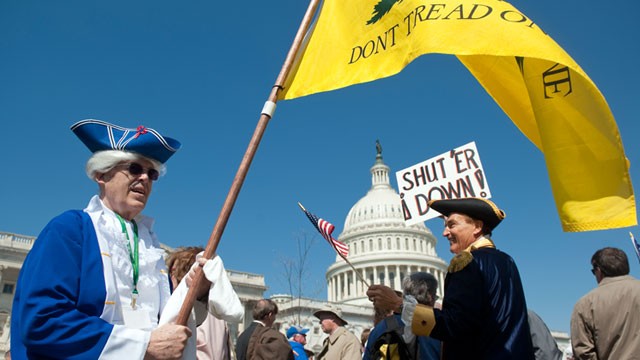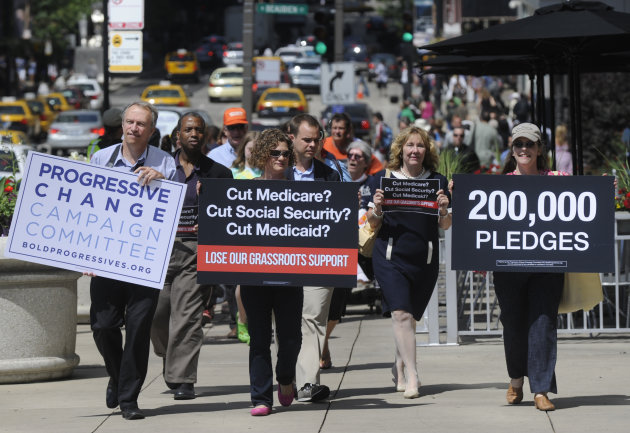The Internal Revenue Service inappropriately flagged conservative political groups for additional reviews during the 2012 election to see if they were violating their tax-exempt status, a top IRS official said Friday.
Organizations were singled out because they included the words “tea party” or “patriot” in their applications for tax-exempt status, said Lois Lerner, who heads the IRS division that oversees tax-exempt groups.
In some cases, groups were asked for their list of donors, which violates IRS policy in most cases, she said.
“That was wrong. That was absolutely incorrect, it was insensitive and it was inappropriate. That’s not how we go about selecting cases for further review,” Lerner said at a conference sponsored by the American Bar Association.
“The IRS would like to apologize for that,” she added.
Lerner said the practice was initiated by low-level workers in Cincinnati and was not motivated by political bias. After her talk, she told The AP that no high level IRS officials knew about the practice.
Agency officials found out about the practice last year and moved to correct it, the IRS said in a statement. The statement did not specify when officials found out.
About 75 groups were inappropriately targeted. None had their tax-exempt status revoked, Lerner said.
Senate Republican Leader Mitch McConnell of Kentucky called on the White House to investigate.
“Today’s acknowledgement by the Obama administration that the IRS did in fact target conservative groups in the heat of last year’s national election is not enough,” McConnell said. “I call on the White House to conduct a transparent, government-wide review aimed at assuring the American people that these thuggish practices are not under way at the IRS or elsewhere in the administration against anyone, regardless of their political views.”
Many conservative groups complained during the election that they were being harassed by the IRS. They accused the agency of frustrating their attempts to become tax exempt by sending them lengthy, intrusive questionnaires.
The forms, which the groups made available at the time, sought information about group members’ political activities, including details of their postings on social networking websites and about family members.
Certain tax-exempt charitable groups can conduct political activities but it cannot be their primary activity.
IRS Commissioner Douglas Shulman told Congress in March 2012 that the IRS was not targeting groups based on their political views.
“There’s absolutely no targeting. This is the kind of back and forth that happens to people” who apply for tax-exempt status, Shulman told a House Ways and Means subcommittee.
Shulman was appointed by President George W. Bush. His 6-year term ended in November. President Barack Obama has yet to nominate a successor. The agency is now being run by acting Commissioner Steven Miller.
“The Ways and Means Committee has persistently pushed the IRS to explain why it appeared to be unfairly targeting some political groups over others — a charge they repeatedly denied,” said Rep. Charles Boustany, R-La., chairman of the Ways and Means oversight subcommittee.
“The IRS’s ‘too little too late’ response is unacceptable, and I will continue to work to ensure there are protections in place so no American, regardless of political affiliation, has their right to free speech threatened by the IRS,” Boustany said.
Tea Party groups were livid on Friday.
“I don’t think there’s any question we were unfairly targeted,” said Tom Zawistowski, who until recently was president of the Ohio Liberty Coalition, an alliance of tea party groups in the state.
Zawistowski’s group was among many conservative organizations that battled the IRS over what they saw as its discriminatory treatment of their effort to gain non-profit status. The group first applied for non-profit status in June 2009, and it was finally granted on Dec. 7, 2012, he said — one month after Election Day.
During the 2012 election, many tea party groups applied for tax-exempt status under section 501 (c) (4) of the federal tax code, which grants tax-exempt status to social welfare groups. Unlike other charitable groups, these organizations are allowed to participate in political activities but their primary activity must be social welfare.
That determination is up to the IRS.
Lerner said the number of groups filing for this tax-exempt status more than doubled from 2010 to 2012, to more than 3,400. To handle the influx, the IRS centralized its review of these applications in an office in Cincinnati.
Lerner said this was done to develop expertise among staffers and consistency in their reviews. As part of the review, staffers look for signs that groups are participating in political activity. If so, IRS agents take a closer look to make sure that politics isn’t the group’s primary activity, Lerner said.
As part of this process, agents in Cincinnati came up with a list of things to look for in an application. As part of the list, they included the words, “tea party” and “patriot,” Lerner said.
“It’s the line people that did it without talking to managers,” Lerner. “They’re IRS workers, they’re revenue agents.”
In all, about 300 groups were singled out for additional review, Lerner said. Of those, about a quarter were singled out because they had “tea party” or “patriot” somewhere in their applications.
The IRS statement said that once applications were chosen for review, they all “received the same, even-handed treatment.”
Lerner said 150 of the cases have been closed and no group had its tax-exempt status revoked, though some withdrew their applications.
“Mistakes were made initially, but they were in no way due to any political or partisan rationale,” the IRS said in a statement. “We fixed the situation last year and have made significant progress in moving the centralized cases through our system.”
Marcus S. Owens, who spent a decade leading the IRS division that oversees tax-exempt organizations, said Friday that it made sense that the problem arose among workers in Cincinnati because the agency “really has delegated a lot of authority” to local offices to make decisions about handling their workload.
But Tea Party groups weren’t buying the idea that the decision to target them was solely the responsibility of low-level IRS workers.
“It is suspicious that the activity of these ‘low-level workers’ was unknown to IRS leadership at the time it occurred,” said Jenny Beth Martin, national coordinator for Tea Party Patriots, which describes itself as the nation’s largest tea party organization. “President Obama must also apologize for his administration ignoring repeated complaints by these broad grassroots organizations of harassment by the IRS in 2012, and make concrete and transparent steps today to ensure this never happens again.”
Story Update:

The Internal Revenue Service is apologizing for what it acknowledges was “inappropriate” targeting of conservative political groups during the 2012 election to see if they were violating their tax-exempt status.IRS agents singled out dozens of organizations for additional reviews because they included the words “tea party” or “patriot” in their exemption applications, Lois Lerner, who heads the IRS division that oversees tax-exempt groups, said Friday. In some cases, groups were asked for lists of donors, which violates IRS policy in most cases, she said.The agency — led at the time by a Bush administration appointee — blamed low-level employees, saying no high-level officials were aware. But that wasn’t good enough for Republicans in Congress, who are conducting several investigations and asked for more.
——
Click below for the full article:
http://abcnews.go.com/Politics/wireStory/irs-apologizes-targeting-conservative-groups-19151151




